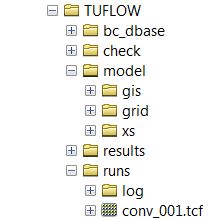FLO2D to TUFLOW: Difference between revisions
Chris Huxley (talk | contribs) |
Chris Huxley (talk | contribs) |
||
| Line 79: | Line 79: | ||
Items not automatically translated across to the TUFLOW model include: |
Items not automatically translated across to the TUFLOW model include: |
||
* Depth varying manning n (shallow n) properties |
* Depth varying manning n (shallow n) properties - This information can manually be added to the TUFLOW model using: ''Read Materials File == <file>'' |
||
* Distributed hydrology rainfall inflow data - This information can be added to the TUFLOW model manually using: ''Read GIS RF == <file>'' |
|||
* |
* Infiltration and evaporation data - This information can be added to the TUFLOW model manually using: ''Read Soils File == file.tsoilf'' |
||
* 1D channel data - This information can be added to the TUFLOW model manually by ESTRY inputs: ''ESTRY Control File == <.ecf_file>'' |
|||
* Infiltration and evaporation data |
|||
* Dam and levee breach data - This information can be added to the TUFLOW model manually using: ''Read GIS Variable Z Shape == <file> |
|||
* 1D channel data |
|||
* Dam and levee breach data |
|||
== Model Conversion Limitations == |
== Model Conversion Limitations == |
||
Revision as of 05:03, 7 February 2015
Introduction
This page outlines some utilities that may be used to convert FLO2D model files into a format which compatible with TUFLOW. The utilities are available for download from the the TUFLOW website.
If you have any suggestions to be included in these pages, please email support@tuflow.com.
Model Conversion Utility (FLO2D_to_GIS.exe)
The flo2d_to_gis.exe utility creates a complete TUFLOW model from FLO-2D model data. The utility converts the following data into a TUFLOW compatible format:
- Model origin, grid orientation, extent and resolution information
- Topography datasets
- Landuse delineation
- Storage adjustment features
- Width reduction factors (flow constriction features)
- Inflow/outflow locations
- Boundary condition timeseries data
These datasets are written to the standard TUFLOW model folder structure. TUFLOW control files are also output (tcf, tcg, tbc, boundary condition database).
Note: This utility is currently still in its beta testing phase. Output should be carefully quality checked.
Utility Execution
The TUFLOW Model Conversion (TMC) file is used to define the input files and projection information required by the utility. Steps how to create a TMC file and run the utility are as follows:
- Place a copy of the flo2d_to_GIS.exe utility in the same location as the FLO2D model files.
- Create a new text file in the same location as the FLO2D model files. The name is must have the extension ".tmc". For example the file name could be "run_model_Conversion.tmc".
- Enter the relevant command syntax (shown in italics below).
- The model conversion can be run either by dragging the TMC file onto the flo2d_to_GIS.exe utility or from a batch file. Steps to create a batch file are:
- Create a new text file in the same location as the TMC and FLO-2D files. The file name must have the extension ".bat". For example the file name could be "run_FLO2D_to_GIS.bat".
- Reference the executable, specify the batchfile flag and the TMC file name. Additional conversion references can be specified to process multiple models in series, for example:
- flo2d_to_GIS.exe -b conv1.tmc
- flo2d_to_GIS.exe -b conv2.tmc
- flo2d_to_GIS.exe -b conv3.tmc
- Double click the batch file in windows explore to execute the model conversion.
Required TMC File Inputs:
- FLO-2D floodplain grid element data file:
- FLO2D FPLAIN == <Filename>
- FLO-2D co-ordinate point data file:
- FLO2D CADPTS == <Filename>
- FLO-2D inflow hydrograph data file:
- FLO2D INFLOW == <Filename>
- FLO-2D outflow hydrograph data file:
- FLO2D OUTFLOW == <Filename>
- Projection Data (four available options)
- MI Projection == <coordinate projection line from .mif file>
- MI Projection File == <link to .mif file used for setting projection>
- SHP Projection == <coordinate projection line from .prj file>
- SHP Projection File == <link to .prj file used for setting projection>
Optional TMC File Inputs:
- FLO-2D floodplain area and width reduction data file:
- FLO2D ARF == <Filename>
Example Syntax
Description: Convert a FLO2D model into TUFLOW format using a shp projection file
FLO2D FPLAIN == FPLAIN.DAT FLO2D CADPTS == CADPTS.DAT FLO2D INFLOW == INFLOW.DAT FLO2D OUTFLOW == OUTFLOW.DAT FLO2D ARF == ARF.DAT !#Optional SHP Projection File == Projection.prj
Description: Convert a FLO2D model into TUFLOW format using a mif coordinate projection line from
FLO2D FPLAIN == FPLAIN.DAT FLO2D CADPTS == CADPTS.DAT FLO2D INFLOW == INFLOW.DAT FLO2D OUTFLOW == OUTFLOW.DAT FLO2D ARF == ARF.DAT !#Optional MI Projection == CoordSys NonEarth Units "survey ft" Bounds (1910000, 14400000) (2000000, 14500000)
Utility Output
flo2d_to_gis.exe will convert the FLO-2D model into a working TUFLOW model titled: conv_001.tcf
The following items will be identical between the FLO-2D and TUFLOW models:
- Model origin, grid orientation, extent and resolution to the FLO-2D
- Topography (elevation) datasets
- Landuse delineation (non-varying with depth)
- Storage adjustment features
- Width reduction factors (flow constriction features)
- Inflow/outflow locations
- Boundary condition time series data
Items not automatically translated across to the TUFLOW model include:
- Depth varying manning n (shallow n) properties - This information can manually be added to the TUFLOW model using: Read Materials File == <file>
- Distributed hydrology rainfall inflow data - This information can be added to the TUFLOW model manually using: Read GIS RF == <file>
- Infiltration and evaporation data - This information can be added to the TUFLOW model manually using: Read Soils File == file.tsoilf
- 1D channel data - This information can be added to the TUFLOW model manually by ESTRY inputs: ESTRY Control File == <.ecf_file>
- Dam and levee breach data - This information can be added to the TUFLOW model manually using: Read GIS Variable Z Shape == <file>
